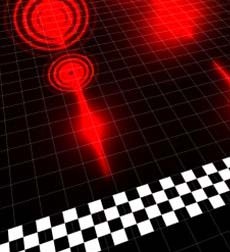How Fast is the Speed of Light?

By Julianne Glaser
For more than 100 hundred years, the speed of light has been one of the accepted constants in physics—at 186,282 miles per hour in a vacuum—a rate that would allow one to circle the Earth 7.5 times in one second! But is the speed of light really constant?
Racing Photons
In 1905 Albert Einstein concluded in his special theory of relativity that the speed of light is constant (“c”) for everyone, no matter how fast or in what direction the observer is moving. But recent research led by Miles Padgett, an optical physicist with the University of Glasgow, has shed new light on the special relativity theory. Padgett’s experiments have provided evidence that the speed of light in a vacuum isn’t so steady after all and should be treated as a limit rather than a constant rate.
Earlier research had indicated that the structure of light could affect its speed, because light is both a particle and a wave composed of photons (particles) that exhibit wave-like behavior. Based on this principle, Padgett’s team devised a series of experiments to focus and manipulate light pulses in order to reduce the speed of light, even in vacuum conditions.

Using racing light photons, which were identical in every feature except structure, the researchers directed pairs of photons on two separate paths toward a detector. One photon travelled through a pair of devices that manipulated the structure of the light and then switched it back; the other photon was not manipulated and was sent directly through a fiber.
If light structure did not matter, the two photons should have arrived at the same time. However, photons with manipulated structures consistently fell behind the other photons. Measurements revealed that the structured light lagged behind several micrometers per meter of distance traveled.
“It’s very impressive work. I’m not surprised the effect exists, but it’s surprising that the effect is so large and robust,” said Robert Boyd, an optical physicist at the University of Rochester in New York.
However, Greg Gbur, an optical physicist at the University of North Carolina at Charlotte, claims, “The findings won’t change the way physicists look at the aura emanating from a lamp or flashlight. But the speed corrections could be important for physicists studying extremely short light pulses.”
Extension Questions
- What other factors could impact the speed of light?
- What other theories inventions are attributed to Albert Einstein?
- What other physical scientific constants or “truths” have changed throughout history?